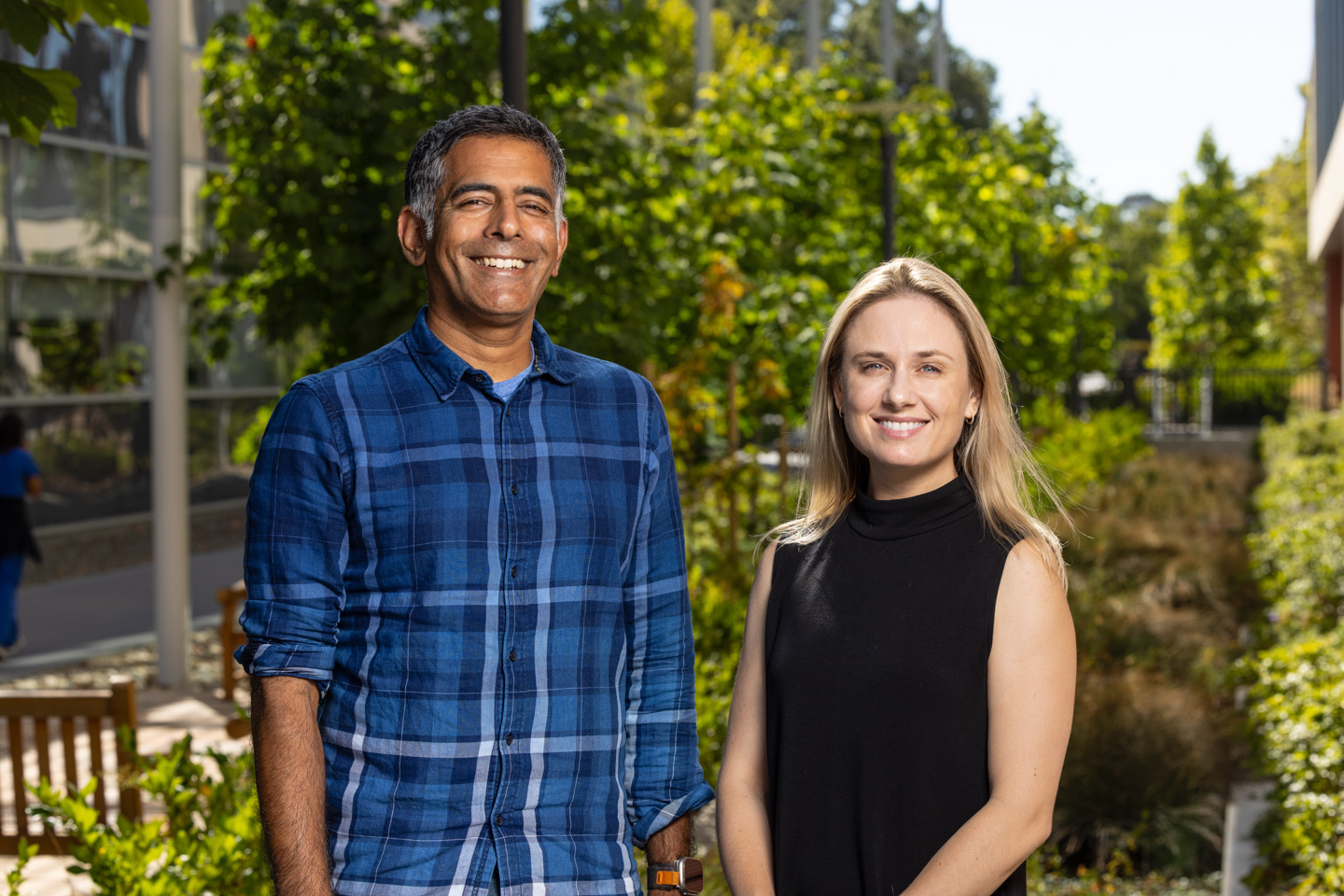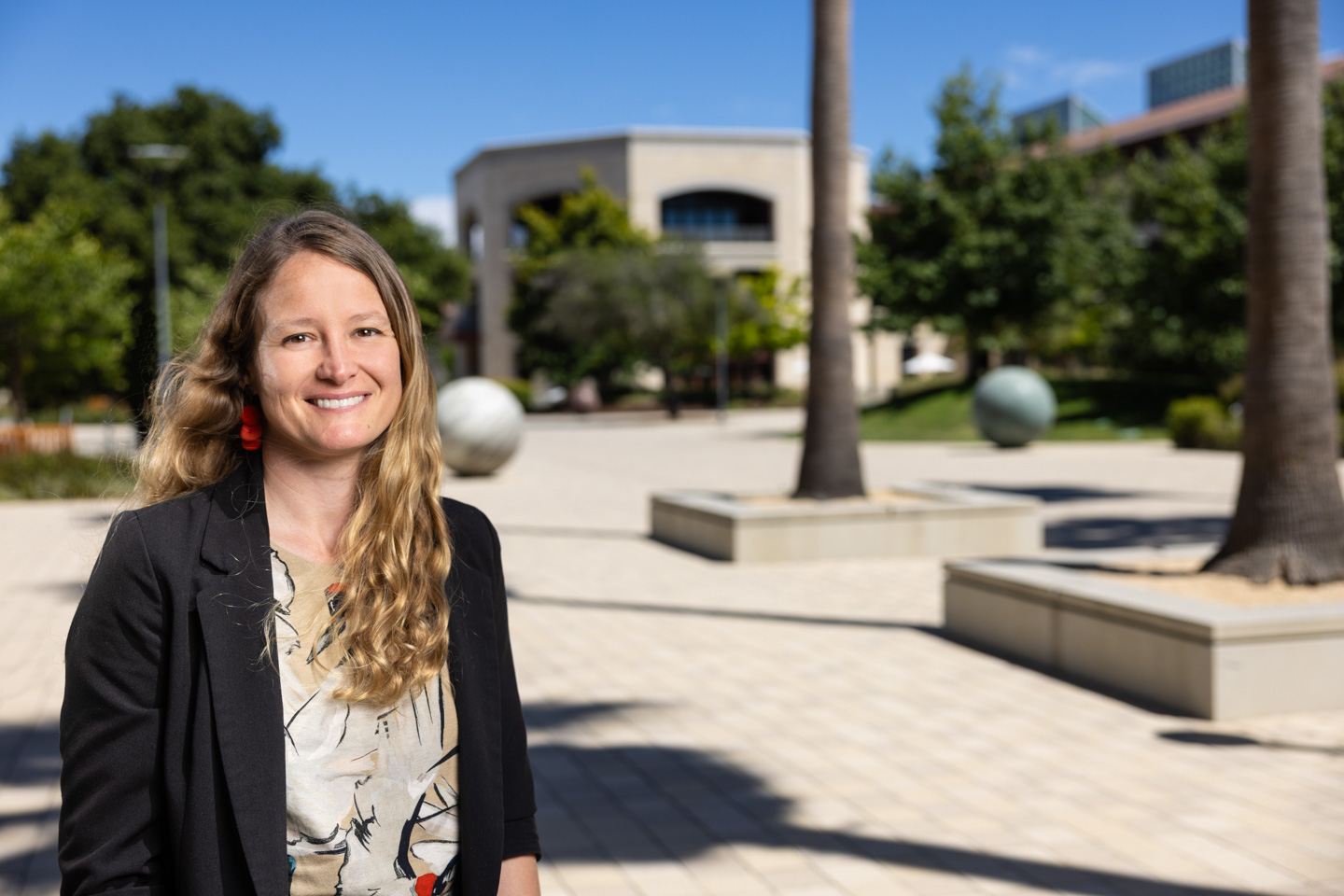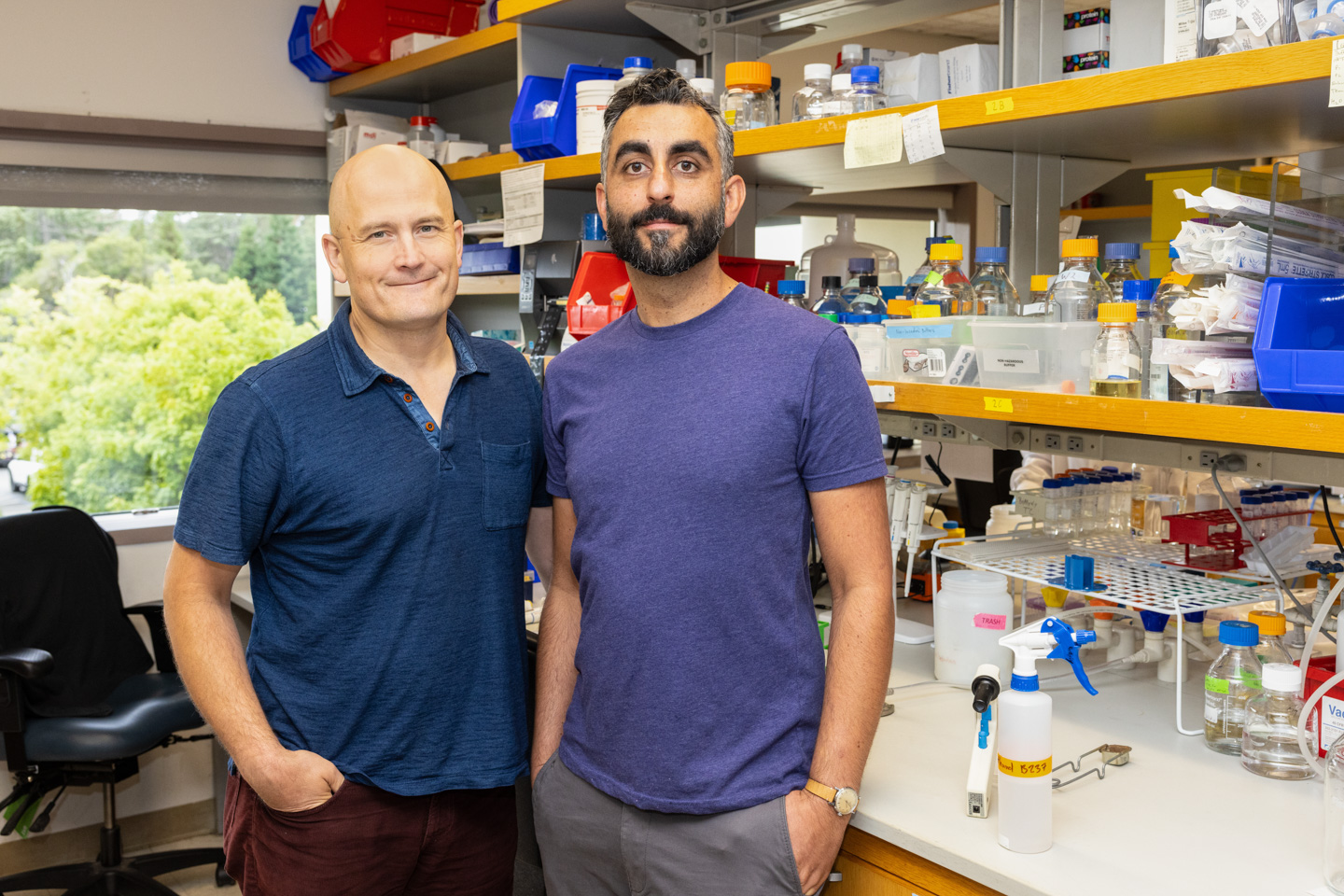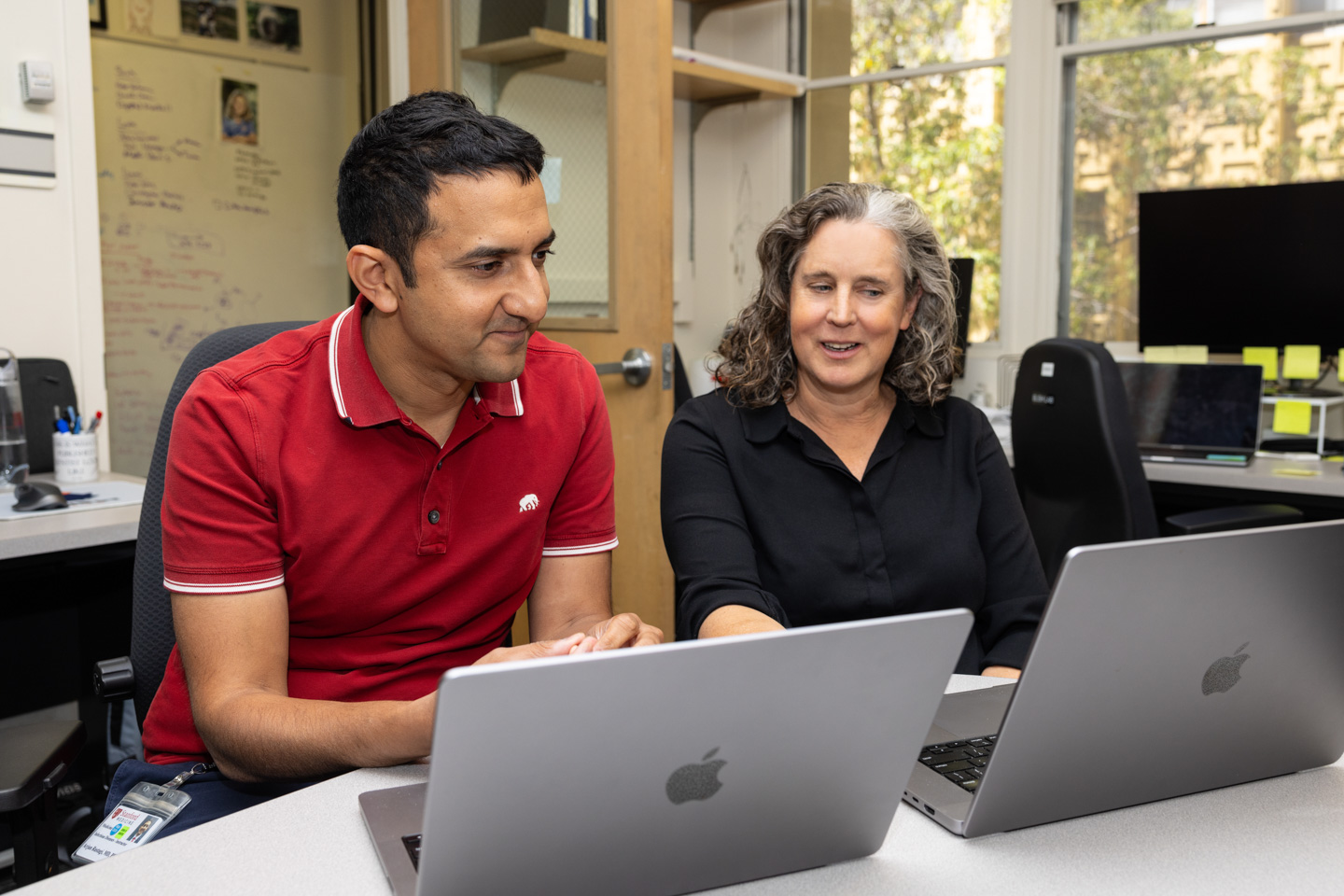Renewing the Field
Nurturing the Next Generation of Infectious Disease Physician-Scientists
Renewing the Field
Nurturing the Next Generation of Infectious Disease Physician-Scientists
The COVID-19 pandemic highlighted the importance of having a robust workforce of skilled infectious disease physicians and researchers. They played a vital role in vaccine development, understanding the virus’s behavior, diagnosing and treating patients, and studying its transmission.
To cultivate a vibrant field that continues to flourish and attract the sharpest and brightest minds, the division of infectious diseases and geographic medicine prioritizes mentoring and nurturing the next generation of infectious disease physician-scientists. When another pandemic happens, these emerging new scientists will be the ones on the front lines tasked with safeguarding the public’s health.
Many of the Infectious Diseases Fellows gain clinical experience, connecting with patients and helping them live healthier lives before transitioning to become postdoctoral trainees in laboratory collaborations where they don their creative hats and delve into the depths of exploration. A comprehensive understanding of both clinical and research aspects prepares the trainees for leadership roles as physician-scientists.
Mentors provide both the space and guidance for trainees to engage creatively with the work and pursue innovative and novel solutions to pressing health problems, while also actively assisting them in securing National Institutes of Health grants and other sources of funding.
These grants serve as a crucial milestone, enabling trainees to establish their research programs and replenish the infectious disease field with new and exciting findings.
This year, four trainees stand out, having received top scores for their grant proposals on the first try, an “exceedingly rare” achievement, according to John Scroggs, senior administrative division director. In their own words, the four profiles that follow reflect the trainees’ exceptional abilities and the quality of mentorship they receive, as well as examples of how they recharge, renew, and stave off burnout in a rigorous and competitive industry.
“They are going to be the next generation of the best of the best,” Scroggs says.
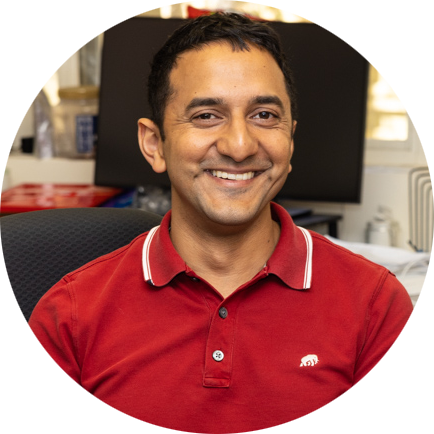
Arjun Rustagi, MD, PhD
Instructor of Medicine, Division of Infectious Diseases and Geographic Medicine, Postdoctoral Research Fellow, Blish Lab
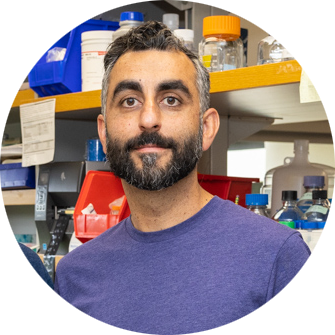
Arya Khosravi, MD, PhD
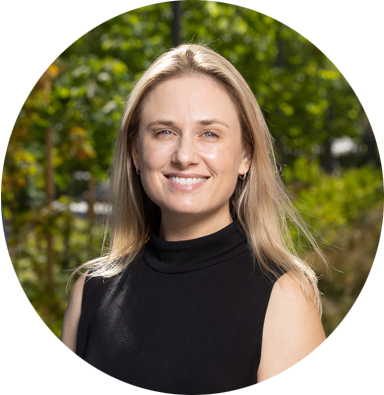
Karen B. Jacobson, MD, MPH
Instructor of Medicine, Division of Infectious Diseases and Geographic Medicine, The Stephen Bechtel Endowed Fellow in Pediatric Translational Medicine, Postdoctoral Medical Fellow, The Jagannathan Lab
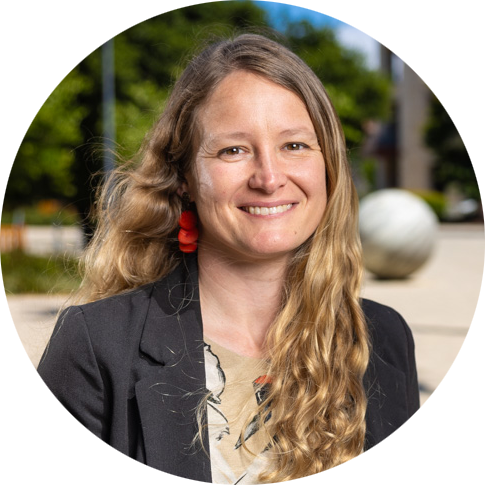
Joelle I. Rosser, MD
Instructor of Medicine, Division of Infectious Diseases and Geographic Medicine, Faculty Fellow, Center for Innovation and Global Health, Postdoctoral Research Fellow, Luby Lab

Arjun Rustagi, MD, PhD
Instructor of Medicine, Division of Infectious Diseases and Geographic Medicine, Postdoctoral Research Fellow, Blish Lab

Arya Khosravi, MD, PhD

Karen B. Jacobson, MD, MPH
Instructor of Medicine, Division of Infectious Diseases and Geographic Medicine, The Stephen Bechtel Endowed Fellow in Pediatric Translational Medicine, Postdoctoral Medical Fellow, The Jagannathan Lab

Joelle I. Rosser, MD
Instructor of Medicine, Division of Infectious Diseases and Geographic Medicine, Faculty Fellow, Center for Innovation and Global Health, Postdoctoral Research Fellow, Luby Lab
Arjun Rustagi, MD, PhD
Research focus: Reproducing SARS-CoV-2 infection of the human lung in the lab, in order to understand the types of lung inflammation caused by viruses and how to stop them.
How the research advances the field: Identified several pathways that allow SARS-CoV-2’s entry into cells, and determined unexpected cellular targets in the human lung, including macrophages. These findings present new therapeutic targets to reduce SARS-CoV-2 infection and lung inflammation.
Published: 37 publications
Funding: Mentored Career Development Award (K08) from the National Institute of Allergy and Infectious Diseases: $772,000 over four years
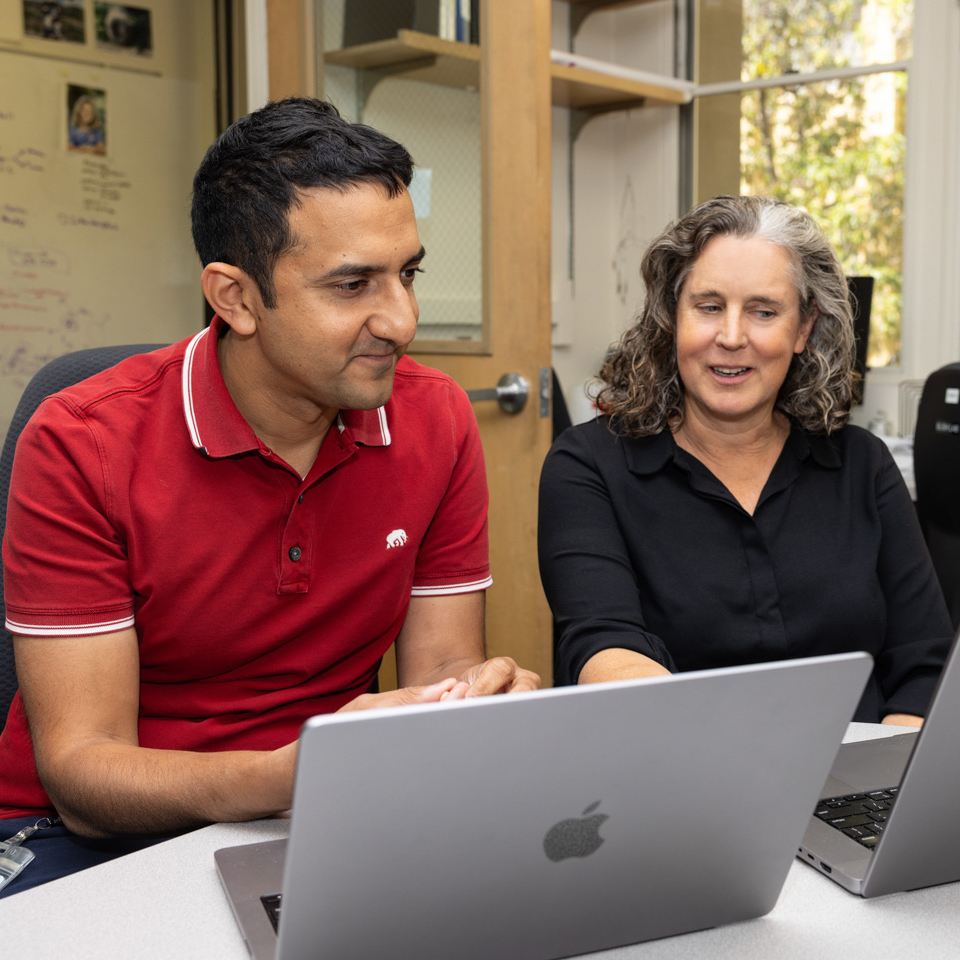
Arjun Rustagi, MD, PhD, and Catherine Blish, MD, PhD

Arjun Rustagi, MD, PhD, and Catherine Blish, MD, PhD
Arjun Rustagi, MD, PhD
Research focus: Reproducing SARS-CoV-2 infection of the human lung in the lab, in order to understand the types of lung inflammation caused by viruses and how to stop them.
How the research advances the field: Identified several pathways that allow SARS-CoV-2’s entry into cells, and determined unexpected cellular targets in the human lung, including macrophages. These findings present new therapeutic targets to reduce SARS-CoV-2 infection and lung inflammation.
Published: 37 publications
Funding: Mentored Career Development Award (K08) from the National Institute of Allergy and Infectious Diseases: $772,000 over four years

— Catherine Blish, MD, PhD, George E. and Lucy Becker Professor of Medicine
The power of mentorship: Having Catherine as a mentor has been essential. She connected me to collaborators and provided opportunities for me to build research infrastructure at Stanford. When the university shut down during the pandemic, she helped me logistically continue my biobank and BSL3 work.
What the future holds: Looking for a permanent job as a physician-scientist, ideally in the Bay Area, where my partner is also a physician-scientist.
Takeaways from the pandemic: The COVID-19 pandemic has shown us that science in a vacuum or shared only among scientists misses an opportunity to inform the public and help nonscientists think about complex biomedical concepts. I am inspired by programs like Radiolab that mix scientific concepts with audio and visual arts. To help the public better understand my work, I teamed up with art students who helped me translate my main scientific project (studying lung inflammation that happens in response to infection) into artistic concepts.
Preference: Clinical or research? In college, I initially could not decide. Then, the summer before senior year I joined a program working with students in Arusha, Tanzania, to teach basic HIV biology. As I spent time with people living with HIV in the community, I felt that with HIV and infectious disease, I could blend my interests in clinical medicine and basic science and have a fulfilling career. I then worked in a biomedical lab for a couple of years while I applied to MD/PhD programs.
Preventing physician burnout: This is really hard. Our lab has regular social events and retreats, usually overnight at a house in Sonoma or along the coast north of San Francisco. These retreats provide an annual opportunity to take stock. I also benefit from talking and interacting in person with other postdocs and fellows in the lab about the intersection of science, medicine, family, and maintaining balance.
Unwinding with the family: Bike rides through Golden Gate Park with my daughters or playing ultimate Frisbee in the park or on the beach; car camping and trying new restaurants.
Hobbies: Listening to music and podcasts; playing the piano and saxophone; gardening; tending to orchids and my aquarium.
Arya Khosravi, MD, PhD
Research focus: Host-microbial interactions. Specifically, I am studying how some bacteria partner with a virus to establish an ecological niche and cause chronic infections, which are very difficult to treat and are a major cause of suffering and even death.
How the research advances the field: Provides insight into the pathophysiology of chronic infections, allowing for the development of more effective diagnostic and therapeutic interventions.
Published: Three publications (1 article, 2 reviews) while at Stanford; 10 other publications previously
Funding: Cystic Fibrosis Foundation, Doris Duke Charitable Foundation
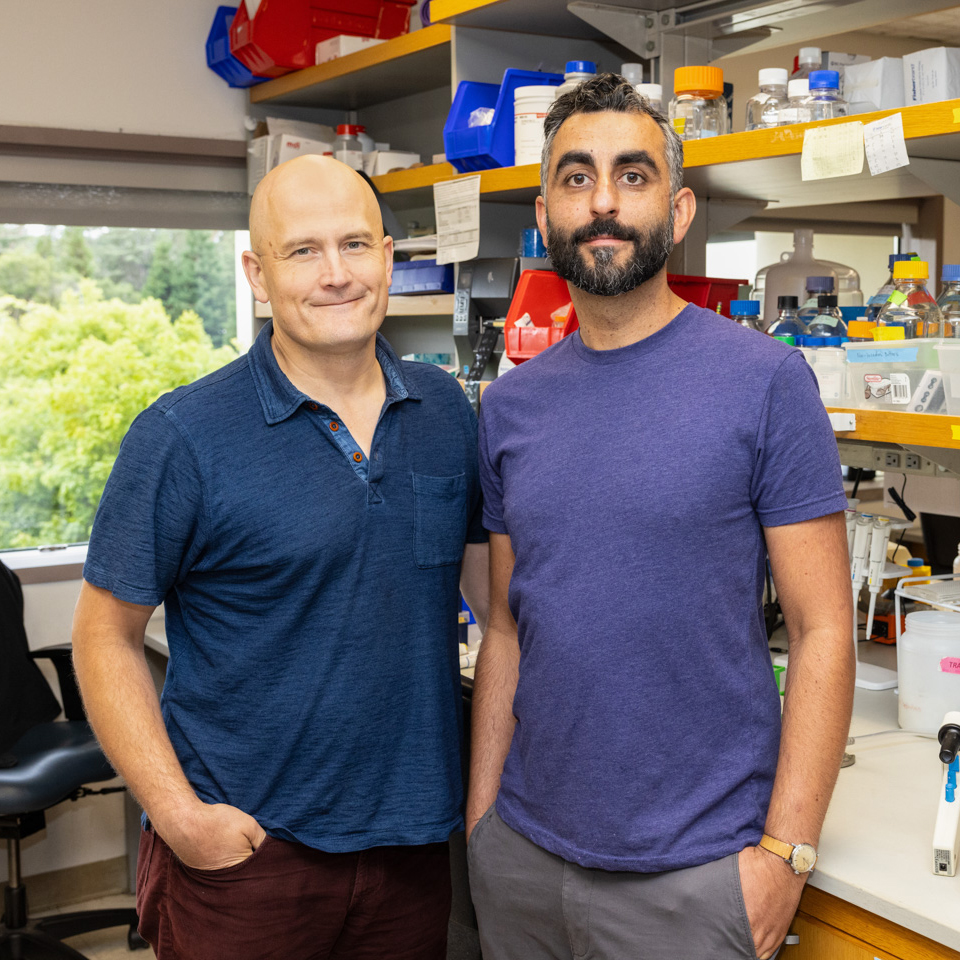
Paul Bollyky, MD, PhD (left), and Arya Khosravi, MD, PhD

Paul Bollyky, MD, PhD (left), and Arya Khosravi, MD, PhD
Arya Khosravi, MD, PhD
Research focus: Host-microbial interactions. Specifically, I am studying how some bacteria partner with a virus to establish an ecological niche and cause chronic infections, which are very difficult to treat and are a major cause of suffering and even death.
How the research advances the field: Provides insight into the pathophysiology of chronic infections, allowing for the development of more effective diagnostic and therapeutic interventions.
Published: Three publications (1 article, 2 reviews) while at Stanford; 10 other publications previously
Funding: Cystic Fibrosis Foundation, Doris Duke Charitable Foundation

— Paul Bollyky, MD, PhD, associate professor of infectious diseases and of microbiology and immunology
Why a career as a physician-scientist? In undergrad, I got a job washing glassware in a lab focused on bacteria that cause infections. The principal investigator and lab members included me in discussions and explained to me what they were studying and why, as well as the methods by which they pursued their studies. I attended clinical rounds and got to see how the same bacteria we were studying in the lab were causing disease in patients. I was hooked. This was exciting, precise work that allowed me to be creative and work alongside passionate and incredibly intelligent individuals while at the same time offering the possibility of providing a significant impact on patient outcomes.
When I eventually started my own project, the lab members helped me understand the difference between statistically significant and meaningful data as well as taught me to be my own harshest critic. They also instilled the value that the purpose of science is to advance knowledge and our understanding of life.
Preference: Clinical or research? Research. It provides me more opportunities to be creative and explore ideas. I very much appreciate patient care and feel my time spent on service is more productive and possibly more meaningful than time in the lab. However, there is a lot of repetition. We often see similar cases and have near-identical discussions with the primary teams calling daily for consultations. In contrast, the questions I am trying to answer in the lab can change drastically from week to week. It’s rewarding to watch a project or idea evolve over time.
What do you love about the job? Allows me to be curious and connect dots. It’s fun when immunology intersects with microbiology, metabolism, ecology, and even philosophy.
Preventing burnout: When I am not in the lab, I am sleeping or watching TV shows to unwind. When I can make time, I enjoy reading and woodworking.
Karen B. Jacobson, MD, MPH
Research focus: Global Health, SARS-CoV-2, Malaria: Studies the natural history, epidemiology, and long-term effects of COVID-19. Most recently, studying the effects of SARS-CoV-2 infection in pregnancy on infant growth and development in Uganda.
How the research advances the field: By leveraging a cohort of pregnant women enrolled in malaria clinical trials in eastern Uganda, my colleagues and I were able to retrospectively document the spread of SARS-CoV-2 during the first pandemic waves when it was spreading undetected due to a lack of available testing. After the first Omicron wave in early 2022, nearly 100% of the cohort had been exposed. The data also hinted that there may be an association between COVID-19 in pregnancy and shorter height in infancy, which has not previously been reported. Further research with larger sample sizes is needed to confirm this finding. Next, further research to examine the mechanisms by which COVID-19 in pregnancy, with and without malaria infection, can adversely affect fetal and infant development, and how vaccination can potentially mitigate these effects.
Funding: K23, National Institute of Allergy and Infectious Diseases, $192,000 per year for 5 years (pending); Burroughs Wellcome Fund/ASTMH Postdoctoral Fellowship in Tropical Infectious Diseases; NIH T32; Stephen Bechtel Endowed Fellowship in Pediatric Translational Medicine; Thrasher Early Career Award recipient.
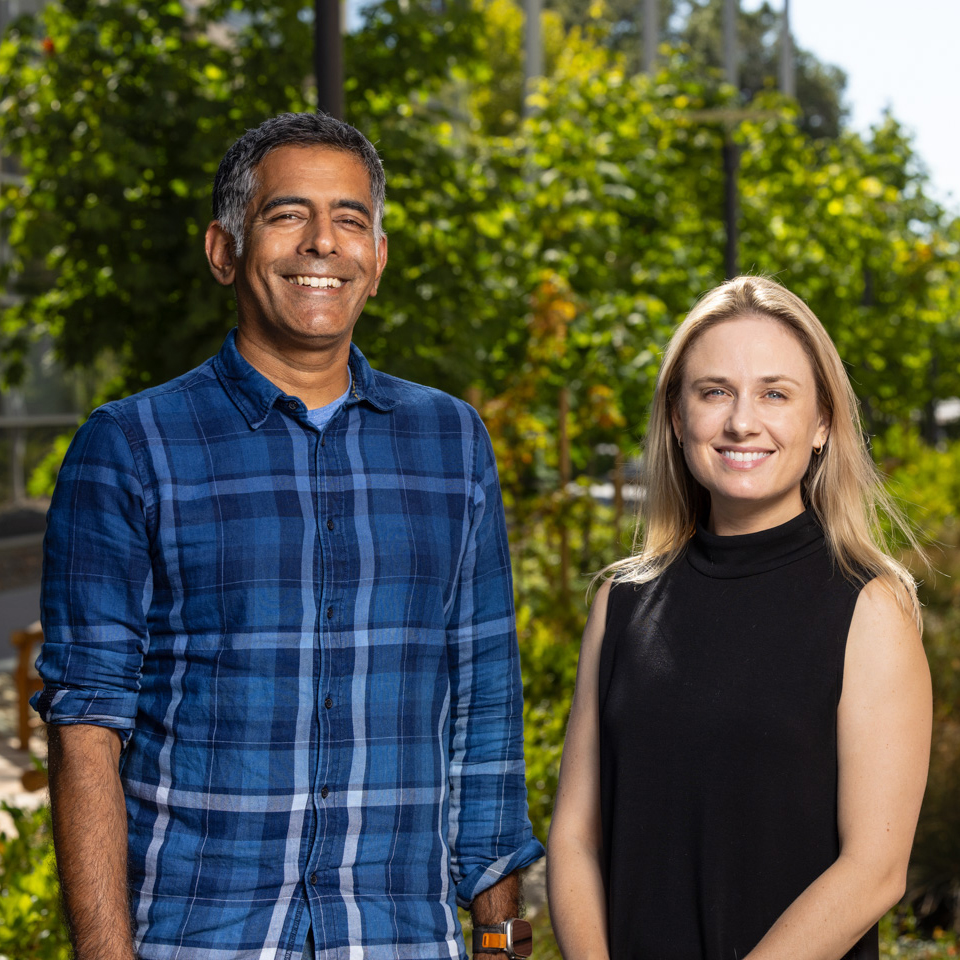
Prasanna Jagannathan, MD, and Karen B. Jacobson, MD

Paul Bollyky, MD, PhD (left), and Arya Khosravi, MD, PhD
Paul Bollyky, MD, PhD (left), and Arya Khosravi, MD, PhD
Karen B. Jacobson, MD, MPH
Research focus: Global Health, SARS-CoV-2, Malaria: Studies the natural history, epidemiology, and long-term effects of COVID-19. Most recently, studying the effects of SARS-CoV-2 infection in pregnancy on infant growth and development in Uganda.
How the research advances the field: By leveraging a cohort of pregnant women enrolled in malaria clinical trials in eastern Uganda, my colleagues and I were able to retrospectively document the spread of SARS-CoV-2 during the first pandemic waves when it was spreading undetected due to a lack of available testing. After the first Omicron wave in early 2022, nearly 100% of the cohort had been exposed. The data also hinted that there may be an association between COVID-19 in pregnancy and shorter height in infancy, which has not previously been reported. Further research with larger sample sizes is needed to confirm this finding. Next, further research to examine the mechanisms by which COVID-19 in pregnancy, with and without malaria infection, can adversely affect fetal and infant development, and how vaccination can potentially mitigate these effects.
Funding: K23, National Institute of Allergy and Infectious Diseases, $192,000 per year for 5 years (pending); Burroughs Wellcome Fund/ASTMH Postdoctoral Fellowship in Tropical Infectious Diseases; NIH T32; Stephen Bechtel Endowed Fellowship in Pediatric Translational Medicine; Thrasher Early Career Award recipient.

— Prasanna Jagannathan, MD, assistant professor of medicine and of microbiology and immunology
The power of mentorship: I have been very lucky to have Dr. Jagannathan as my primary research mentor. He is supportive, enthusiastic, and always available to his trainees, and has cultivated a collaborative yet rigorous lab atmosphere. I feel lucky to have worked with him and learned from his example.
What the future holds: In fall 2023, I joined the Vaccine Study Center within the division of research at Kaiser Permanente Northern California, based in Oakland, as a research faculty member.
Preference: Clinical or research? Both! I prefer to spend most of my time on research because I like to think about the bigger picture, but I think it’s essential to maintain some patient contact and have those personal connections in order to keep a grounded perspective and remember why the bigger picture is so important.
Why a career as a physician-scientist? I knew I wanted to be an infectious disease physician and researcher before going to medical school. The medicine part has always interested me, but I’ve also been intrigued by the societal impact of infections. Pathogens have shaped the course of human history and seem to lay bare so much of our social and political rifts, with infections like HIV, Ebola, and of course COVID-19 more recently. The advances we’ve seen just in the last century — antibiotics, vaccines, a SARS-CoV-2 vaccine developed in less than a year — are astounding. I think it’s such an interesting and important field!
Avoiding burnout: I recently had the opportunity to attend the Gordon Malaria Conference in Spain. Connecting with colleagues from around the world and being able to travel a bit for fun was definitely rejuvenating.
Relaxing after a hard day’s work: Spending time with family and friends and watching TV on my couch.
Joelle I. Rosser, MD
Research focus: Impact of climate change on infectious diseases: evaluating interventions to ameliorate the risks of climate change and foster resiliency and sustainability, employing a combination of field studies and modeling to conduct research. The focus is on populations that are highly vulnerable to climate change in the Asia-Pacific.
How the research advances the field: Climate change poses the greatest threat to human health globally. However, the study of climate change and health — predicting and mitigating the impacts on human health — is still in its infancy. My research focuses on developing new approaches to rigorously studying climate change and health, using a mechanism-based framework and a solution-oriented mindset.
Funding: K23 Career Development Award ($996,0000)
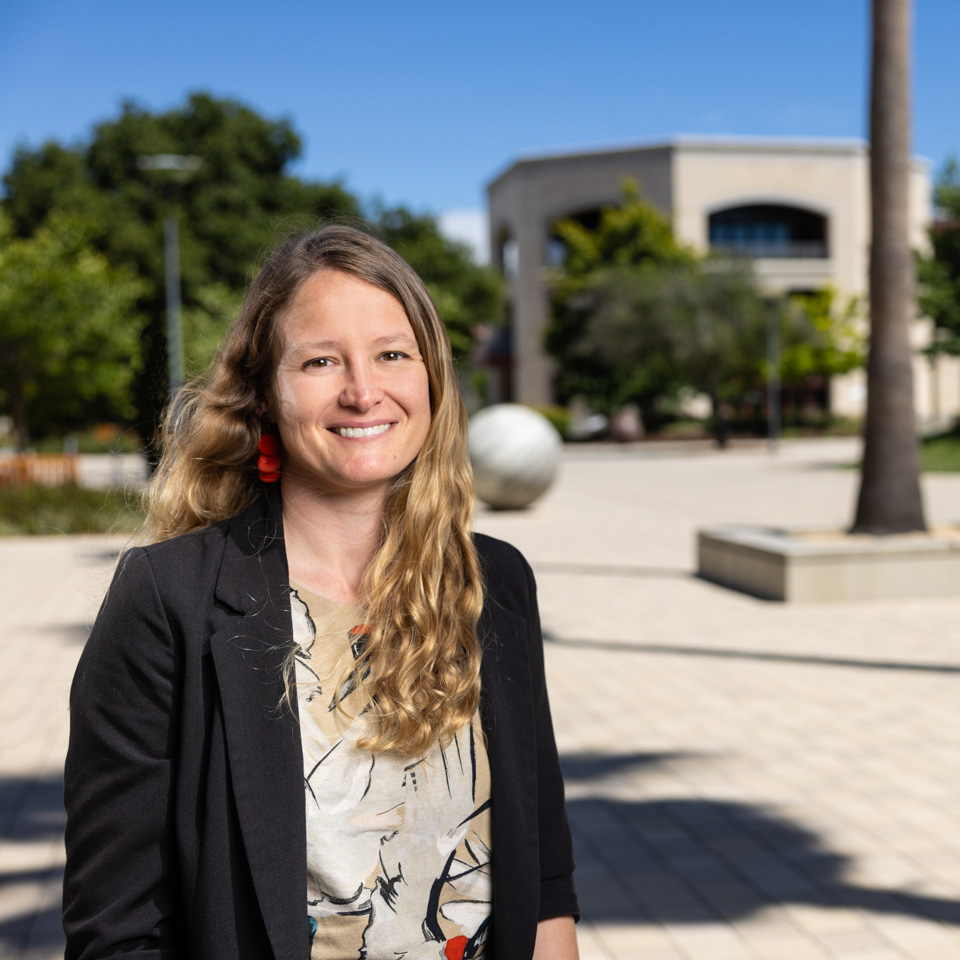
Joelle I. Rosser, MD

Joelle I. Rosser, MD
Joelle I. Rosser, MD
Research focus: Impact of climate change on infectious diseases: evaluating interventions to ameliorate the risks of climate change and foster resiliency and sustainability, employing a combination of field studies and modeling to conduct research. The focus is on populations that are highly vulnerable to climate change in the Asia-Pacific.
How the research advances the field: Climate change poses the greatest threat to human health globally. However, the study of climate change and health — predicting and mitigating the impacts on human health — is still in its infancy. My research focuses on developing new approaches to rigorously studying climate change and health, using a mechanism-based framework and a solution-oriented mindset.
Funding: K23 Career Development Award ($996,0000)

— Stephen Luby, professor of medicine, infectious disease; associate dean for global health research
What the future holds: Continuing my academic research in climate change and infectious diseases with hopes of getting a faculty position somewhere.
Preference: Clinical or research? This is a very difficult question. I love both. They are fundamentally different but also completely complementary. I love interacting with patients, learning about their lives, and working to make their lives better in a very tangible and gratifying way. But I also love the exploration and creativity that research affords. With research, every day feels like a new adventure, a new opportunity. But what makes the research feel worthwhile is also imagining how it might benefit people and the planet in some way later down the road.
Why a career as a physician-scientist? I wanted to be a primatologist. But while studying wildlife conservation, my deepening appreciation for the interdependency between the environment and human health drove me to become a physician-scientist working at this intersection. I also suppose one could argue that by studying medicine, I still did become a primatologist of sorts, just not studying the kind of primate that typically swings from trees.
For the love of science: I love that I get to work with brilliant, caring people with all sorts of different skills and backgrounds. My work is inherently interdisciplinary, and I love learning from and sharing with people across a whole range of expertise.
Active relaxation: Biking, hiking, pack rafting, Latin dancing, windsurfing, challenging my husband to a fierce game of backgammon, and trying to find the best cheese, scones, and hole-in-the-wall music venues.

